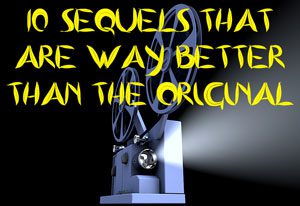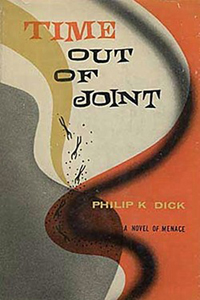“The Man in the High Castle” (1962) put Philip K. Dick on the map, but “Time Out of Joint” (written in 1958, published in 1959) is his first published masterpiece. It also has the benefit of being more accessible than “High Castle,” so you can confidently recommend it to first-time PKD readers.
Unlike most of his 1950s SF novels, “Time Out of Joint” has sharp plotting and well-drawn characters to go along with his reliably attention-grabbing themes. In this case, he explores nostalgia, civil war, off-planet colonization and the military/surveillance state.
Not sci-fi right away
“Time Out of Joint” reads like one of PKD’s 1950s realist novels (none published at the time of their writing) for most of the first three chapters. It doesn’t jump into the SF weirdness right away. This allows us to get to know Ragle Gumm – one of the best PKD protagonists in addition to having one of the best names – a 46-year-old man who makes a living winning newspaper puzzle contests in 1959. He’s a more functional answer to Jack Isidore from “Confessions of a Crap Artist.”

“Time Out of Joint” (1959)
Author: Philip K. Dick
Composition year: 1958
Genre: Science fiction
Setting: The future of 1998, USA
The book naturally plays as nostalgic when read today, but what makes “Time’s” nostalgia fascinating is that PKD is purposely writing about 1959 (his own time) through a nostalgic lens. PKD imagines the future holds nuclear war – along with a one-world government and civil war between the Earth and Luna.
So he (via Gumm) shows great appreciation for things like going to the supermarket and finding everything he needs, for doing newspaper puzzles in the living room, and for relaxing at the park with a cute and simple girl (albeit one who is already spoken for; Junie is similar to Liz from “Puttering About in a Small Land”).
OK, so 2020 is a particularly bad point of comparison, but it’s hard to imagine a writer showing appreciation for today’s contemporary time in relation to an imagined worse time decades later. PKD knew how good he had it in the late ’50s.
A rare predictive novel
“Time Out of Joint” is a rare novel where PKD attempts to predict the future with some specificity. Usually he extrapolates his own time into the future. He adds some tech upgrades like flying cars, rocket ships and robots, but daily life is functionally the same. As he imagines the future 1998 of “Time Out of Joint,” he asks himself how things might radically change.
By doing this, he gets many things “wrong” — hilariously wrong in the case of the teenage street toughs who speak in pidgin English and have Asian hairstyles and African tribal tattoos. But he’s not being absurd for the sake of it. Girls wear men’s clothing, but the logic behind that fashion trend checks out: With men wearing military garb all the time, there is a surplus of men’s suits, and women start to wear them.

While PKD is wrong about nuclear war (and let’s marvel for a second that it’s 2020 and we still haven’t had a worldwide nuclear war), he is correct about the perpetual war state, the surveillance state and the inflation/devaluation of currency.
Plastic tokens are used instead of bills and coins, which is a meaningless distinction since both are government-issued and government-backed, but it’s a good illustration of how the federal government aims to lock down total control of the value of money.
What’s more, government scientists can successfully brainwash people (enough to fill a whole artificial town) into believing it is a different time and place and that they have a different life. (That’s another thing I love about this book: It functions like a time-travel story, but there’s technically no time travel in it.)
Propulsive mystery
“Time Out of Joint’s” 1998 is no more or less ridiculous than any other PKD future, but it’s one that the author puts an unusual amount of serious thought into.
With its propulsive mystery (or sense that something’s not right) in place, “Time Out of Joint” is also a rare PKD novel that could smoothly transfer to film. “The Truman Show” (coincidentally released in 1998) is among the closest cinematic comparisons, especially in the moment where Gumm becomes suspicious of the road-construction workers outside his house.
And “The Village” (2004) borrows this book’s conceit of creating an isolated community within the present that exists in “the past.” Both works use aircraft flying overhead as clues.
Perhaps the neatest clue to readers is that Ragle and his colleagues never mention the name of their town, or what state it’s in. Although the location isn’t always important in a PKD novel, the author almost always tells us the name of the city, so that absence here nagged at the back of my mind.
“Time Out of Joint” includes good observations about civil war (“Every side is wrong. … Everyone is a victim”), but particularly intriguing is one of the reasons (or at least an after-the-fact “reason”) for the war. Among the One Happy World propaganda is the religion-based idea that God says we aren’t meant to settle in space. This notion vilifies the very existence of a self-sufficient Moon settlement.
A rare anti-space travel novel
In the coming decade after PKD’s writing, many Americans protested the policy of using taxpayer dollars to go to the Moon – a POV that was largely ignored during last year’s 50th anniversary moon landing recollections, although it is referenced in “First Man” (2018).
Opposing space travel on religious grounds and on fiscal grounds are two different things, but any argument against space travel is so rare in science fiction – indeed, most of Dick’s 1950s novels glorify the frontier – that it’s fascinating to find it here.
Dick, as well he should, nonetheless sides with those who look to the frontier as an outlet for freedom from oppression – if you can get your settlement to be self-sustaining. And yet PKD (through Ragle Gumm) shows a genuine love for the wonders of his pre-nuclear-war 1950s.
He’s a science fiction author who didn’t dream of a better future. He appreciated the time he lived in, knowing the future would be worse.

